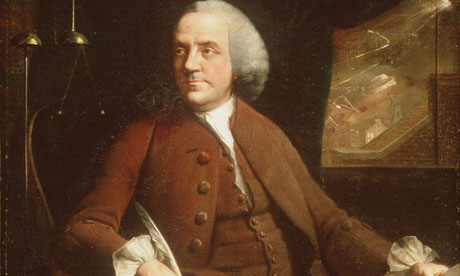
The decade before America's declaration of independence in 1776 saw more Americans visiting England than ever before. This engaging social history, written with a novelist's eye for character and plot, tells their tale – one the author calls "a missing chapter in the social and cultural history of Americans abroad". It focuses on half a dozen Americans living in London on the eve of revolution, who left behind copious evidence of their existences. The book's final chapters chronicle the London days of no less a personage than Benjamin Franklin, whose two decades in London were years of frustration, when his finesse seemed to fail him: "Was [he] suffering from what a later generation would call status anxiety?" Flavell asks.
Franklin may have been the most famous colonial American in London, but he was not the most successful nor the most typical. It was the wealthy southern planter, rather than the self-made Yankee of humble origins, who constituted the (largely accurate)stereotype. Americans and slavery were indivisible in the English brain, as Flavell demonstrates with anecdotes about Englishmen who were shocked to discover that their colonial cousins were white, thinking them instead "a compound mongrel of English, Indian and Negro".
One of Flavell's central figures is Henry Laurens, a rice planter from South Carolina who set out for London with his slave Robert, his son and his wayward niece. She follows them as they manoeuvre through a city that, at the time, was the world's largest, 20 times bigger than Boston or New York. Of the Laurens party, the two most riveting are the two most elusive: Henry's slave Robert and his orphaned niece Molsy, who conceives a baby out of wedlock. (Rumour had it that the father was her brother-in-law, South Carolina's attorney general.) It is difficult to reconstruct the interior lives of this pair, because their own words are absent from the archives. Flavell triangulates them as meticulously as she can, hunting them in the letters of Laurens and others, but she also wraps them in cultural context and literature, some of it anachronistic. She turns, for example, to a novel about West Indians coming to London in 1948, 170 years after Robert's own arrival, to imagine how disorienting it must have been for him first to see whites in degrading poverty. And she projects Molsy into the milieu and sentiments of Jane Austen's heroines.
However much in lust with the metropolis Flavell's well-heeled Americans were, they were there mainly out of social ambition: time in London, which "set the standard in manners, dress and taste for English-speaking people everywhere", was an accessory of gentility, like the English gardens, country houses and clothes they mimicked back home. To someone like Robert, on the other hand, London was more than a finishing school: it offered the possibility of freedom. Molsy also seemed to be after something more profound. Their presence elevates a book that would otherwise be a well-told chronicle of bad behaviour and social climbing, giving it the higher purpose of helping to fill in the gender- and race-shaped gaps of history.

